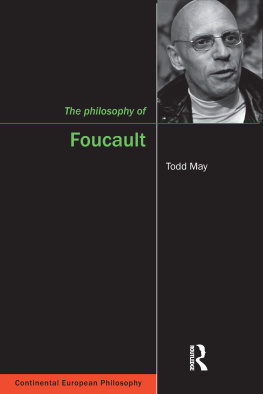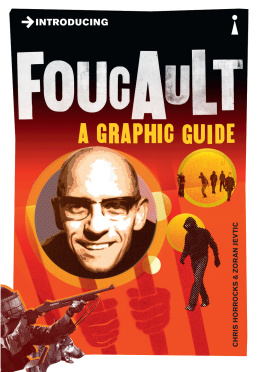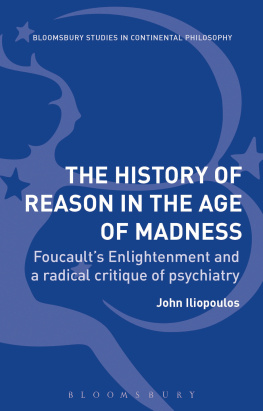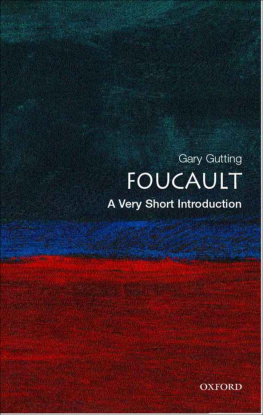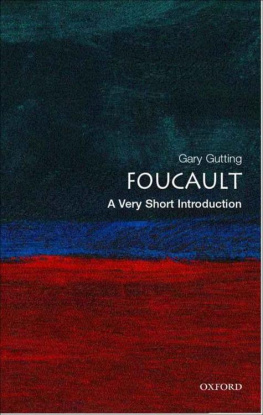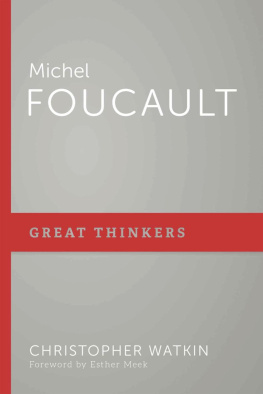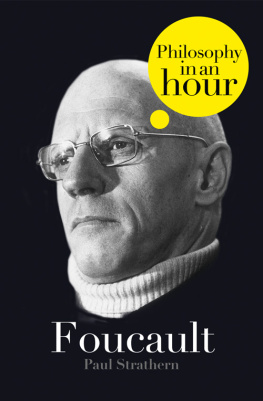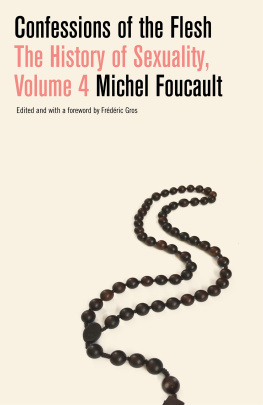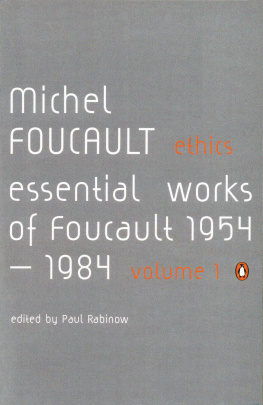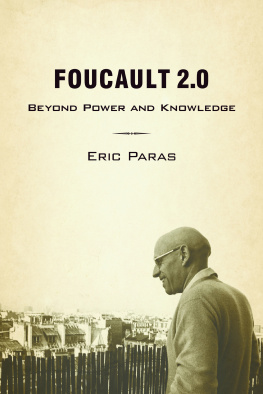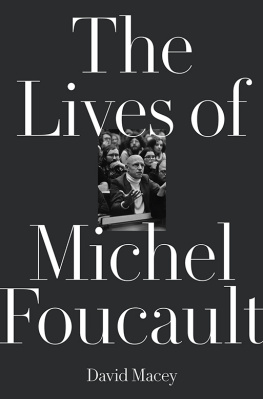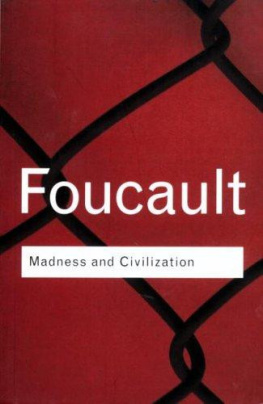Michel Foucault
Key Concepts
Key Concepts
Theodor Adorno: Key Concepts
Edited by Deborah Cook
Alain Badiou: Key Concepts
Edited by Adam Bartlett and Justin Clemens
Pierre Bourdieu: Key Concepts
Edited by Michael Grenfell
Gilles Deleuze: Key Concepts
Edited by Charles J. Stivale
Michel Foucault: Key Concepts
Edited by Dianna Taylor
Jrgen Habermas: Key Concepts
Edited by Barbara Fultner
Martin Heidegger: Key Concepts
Edited by Bret W. Davis
Immanuel Kant: Key Concepts
Edited by Will Dudley & Kristina Englehard
Merleau-Ponty: Key Concepts
Edited by Rosalyn Diprose and Jack Reynolds
Jacques Rancire: Key Concepts
Edited by Jean-Philippe Deranty
Wittgenstein: Key Concepts
Edited by Kelly Dean Jolley
First Published 2011 by Acumen
Published 2014 by Routledge
2 Park Square, Milton Park, Abingdon, Oxon OX14 4RN
711 Third Avenue, New York, NY 10017, USA
Routledge is an imprint of the Taylor and Francis Group, an informa business
Editorial matter and selection, 2011 Dianna Taylor.
Individual contributions, the contributors.
This book is copyright under the Berne Convention.
No reproduction without permission.
All rights reserved. No part of this book may be reprinted or reproduced or utilised in any form or by any electronic, mechanical, or other means, now known or hereafter invented, including photocopying and recording, or in any information storage or retrieval system, without permission in writing from the publishers.
Notices
Practitioners and researchers must always rely on their own experience and knowledge in evaluating and using any information, methods, compounds, or experiments described herein. In using such information or methods they should be mindful of their own safety and the safety of others, including parties for whom they have a professional responsibility.
To the fullest extent of the law, neither the Publisher nor the authors, contributors, or editors, assume any liability for any injury and/or damage to persons or property as a matter of products liability, negligence or otherwise, or from any use or operation of any methods, products, instructions, or ideas contained in the material herein.
ISBN: 978-1-84465-234-1 (hardcover)
ISBN: 978-1-84465-235-8 (paperback)
British Library Cataloguing-in-Publication Data
A catalogue record for this book is available from the British Library.
Designed and typeset in Classical Garamond and Myriad.
Contents
Dianna Taylor
Richard A. Lynch
Marcelo Hoffman
Chlo Taylor
Ellen K. Feder
Todd May
Johanna Oksala
Karen Vintges
Eduardo Mendieta
Edward McGushin
Brad Elliott Stone
Cressida J. Heyes
Dianna Taylor
Ellen K. Feder is Associate Professor of Philosophy at American University in Washington, DC. She is author of Family Bonds: Genealogies of Race and Gender (2007) and is writing a manuscript on ethics and the medical management of intersex.
Cressida J. Heyes is Canada Research Chair in Philosophy of Gender and Sexuality at the University of Alberta and the author of Line Drawings: Defining Women through Feminist Practice (2000) and Self-Transformations: Foucault, Ethics, and Normalized Bodies (2007).
Marcelo Hoffman is Assistant Professor of Political Science at Marian University, Wisconsin. He is the author of Foucaults Politics and Bellicosity as a Matrix for Power Relations (2007). His article Containments of the Unpredictable in Arendt and Foucault is forthcoming.
Richard A. Lynch is Instructor of Philosophy at De Pauw University. His translations include Foucault, Ewald, and Isabelle Thomas-Fogiels Reference and Self-reference: On the Death of Philosophy in Contemporary Thought (forthcoming), and his scholarly articles address Foucault, Hegel, Habermas, Bakhtin and others.
Todd May is Class of 1941 Memorial Professor of the Humanities at Clemson University, USA. He is the author of ten books of philosophy. His most recent work is Contemporary Movements and the Thought of Jacques Ranciere: Equality in Action (2010).
Edward McGushin is an Associate Professor of Philosophy at Saint Anselm College, New Hampshire. He is author of Foucaults Asksis: An Introduction to the Philosophical Life (2007).
Eduardo Mendieta is Professor of Philosophy at the State University of New York, Stony Brook. He is author of Global Fragments: Globalizations, Latinamericanisms, and Critical Theory (2007) and co-editor of Pragmatism, Nation, and Race: Community in the Age of Empire (2009).
Johanna Oksala is Senior Lecturer in Philosophy at the University of Dundee. She is the author of Foucault on Freedom (2005) and How to Read Foucault (2007) as well as numerous articles on Foucault, feminist theory and political philosophy.
Brad Elliott Stone is Associate Professor of Philosophy at Loyola Marymount University, where he is also the Director of the University Honors Program. His research interests are contemporary continental philosophy, philosophy of religion and American pragmatism.
Chlo Taylor is Assistant Professor of Philosophy at the University of Alberta. She is author of The Culture of Confession from Augustine to Foucault (2009) and is writing a manuscript entitled Sex Crimes and Misdemeanours: Foucault, Feminism, and the Politics of Sexual Crime.
Dianna Taylor is Associate Professor of Philosophy at John Carroll University, Ohio. She has written articles on Foucault and Hannah Arendt and co-edited Feminism and the Final Foucault (2004) and Feminist Politics: Identity, Difference, Agency (2007).
Karen Vintges is Lecturer in Social and Political Philosophy at the University of Amsterdam. She is the author of Philosophy as Passion: The Thinking of Simone de Beauvoir (1996) and several other books in both English and Dutch.
Dianna Taylor
Foucault the experimenter
Michel Foucault was not a systematic thinker. He referred to himself as an experimenter as opposed to a theorist (1991a: 27); and asserted that thinking differently and self-transformation, rather than validating what is already known, lay at the core of his philosophical work (1990b: 910). I dont feel that it is necessary to know exactly what I am, Foucault states in a 1982 interview:
The main interest in life and work is to become someone else that you were not in the beginning. If you knew when you began a book what you would say at the end, do you think you would have the courage to write it? What is true for writing and for a love relationship is true also for life. The game is worthwhile insofar as we dont know what will be the end.
(1988: 9)
In addition to being unsystematic, Foucaults work also challenges fundamental aspects of the Western philosophical tradition. As he sees it, philosophers have exerted much intellectual time and effort and devoted many pages to creating a dualistic and overly simplified worldview that valorizes aspects of human existence that provide us with a false sense of our own ability to gain certainty about the world, and to thereby become masters of it and ourselves. This worldview imbues us with a false and misguided sense of security that, nonetheless, because it is preferable to the threat that uncertainty appears to pose, ensures the reproduction and eventual systematizing of the same faulty thinking.


